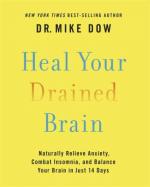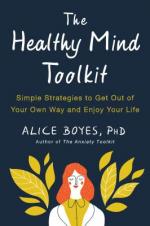May 1, 2019 | sobczakd
May is Mental Health Awareness Month! The definition of mental health encompasses a wide range of conditions that affect how we think, how we feel and how we behave. As the World Health Organization famously says, “There is no health without mental health.” Not everyone faces challenges with their mental well-being. There are days some of us feel a bit down or overwhelmed. With the right coping methods, we can learn what works best for us in order to get back on track towards better health. Here are some books to get you started!
Are you anxious, frazzled, exhausted? Do you find yourself constantly worrying? Do you feel like you're "running on empty"? Do you have trouble sleeping? Like millions of people living today, your brain has become drained. These days, it seems like everything in our day-to-day lives-from our increasingly unpredictable world, to the smartphones we can't stop using, to the processed foods we eat all day long, to the many hours we spend at our jobs-is setting us up to feel drained. The short-term effects of becoming drained are uncomfortable, but the long-term effects can be life-threatening. Left untreated, it can quadruple your risk of high blood pressure-the #1 cause of preventable death. Finding natural solutions to anxiety and insomnia is becoming increasingly vital as sleeping pills, antianxiety medications, and hospitalizations have seen a dramatic spike recently. More and more people are desperate to heal their drained brains.
In his latest book, Dr. Mike Dow offers a 2-week plan designed to help you naturally balance your brain. He explains what drains modern brains and which groups are wired for it, and provides clinically proven tools to help you feel less drained. Dr. Mike offers nutritional tips, recipes, cognitive behavioral tools, supplements, breathing techniques, self-hypnosis, and mindfulness. Stress hormones like cortisol and adrenaline go down as feel-good neurotransmitters like GABA and serotonin rise. "When you balance your brain, you experience countless rewards. You have more energy. You feel like yourself again. You sleep more soundly and wake up looking forward to the day ahead. . . .I can't wait for you to become the best version of yourself, and I look forward to the life you will create when you are no longer drained."
Whether we're aware or not, most of us are perpetrators and victims of self-sabotage, a powerful pattern of negative behavior in which we act against our own best interests and then blame ourselves or others for these self-inflicted failures. Self-sabotage can manifest as seemingly innocuous things like not following through on New Year's resolutions or as harmful actions like blaming or abusing someone we love. If left unchecked, it can damage or destroy marriages, careers, friendships, families, and even lives. In The Healthy Mind Toolkit, Dr. Alice Boyes, author of The Anxiety Toolkit, tackles four key areas of our lives where self-defeating behaviors are most prevalent- our brains/mindsets, self-esteem, relationships and work/money. Blending the latest scientific findings with cutting-edge CBT techniques, Dr. Boyes lays out a practical plan to counter whatever fear, anxiety, guilt, or insecurity is causing you to self-sabotage, including...
- How to identify specific ways you're hurting your success (for ex, setting impossibly high standards, people-pleasing and comparing current relationships to past ones)
- Quizzes at each chapter start to rate your level of self-sabotage in the four areas
- Simple, highly effective steps to quit harmful behaviors and live a healthier, happier life
Covering everything from rumination and envy to imposter syndrome, risk aversion, and over- or undervaluing things, The Healthy Mind Toolkit is the essential guide to get out of your own way and get on the path to success.
What no one tells you about living with anxiety and depression--learned the hard way. Maggy van Eijk knows the best place to cry in public. She also knows that eating super salty licorice or swimming in icy cold water are things that make you feel alive but, unlike self-harm, aren't bad for you. These are the things to remember when you're sad. Turning 27, Maggy had the worst mental health experience of her life so far. She ended a three-year relationship. She lost friends and made bad decisions. She drank too much and went to ER over twelve times. She saw three different therapists and had three different diagnoses. She went to two burn units for self-inflicted wounds and was escorted in an ambulance to a mental health crisis center. But that's not the end of her story. Punctuated with illustrated lists reminiscent of Maggy's popular BuzzFeed posts, How Not to Fall Apart shares the author's hard-won lessons about what helps and what hurts on the road to self-awareness and better mental health. This is a book about what it's like to live with anxiety and depression, panic attacks, self-harm and self-loathing--and it's also a hopeful roadmap written by someone who's been there and is still finding her way.
Nobody ever looked at an empty calendar and said, "The best way to spend this time is by cramming it full of meetings!" or got to work in the morning and thought, Today I'll spend hours on Facebook! Yet that's exactly what we do. Why? In a world where information refreshes endlessly and the workday feels like a race to react to other people's priorities faster, frazzled and distracted has become our default position. But what if the exhaustion of constant busyness wasn't mandatory? What if you could step off the hamster wheel and start taking control of your time and attention? That's what this book is about. As creators of Google Ventures' renowned "design sprint," Jake and John have helped hundreds of teams solve important problems by changing how they work. Building on the success of these sprints and their experience designing ubiquitous tech products from Gmail to YouTube, they spent years experimenting with their own habits and routines, looking for ways to help people optimize their energy, focus, and time. Now they've packaged the most effective tactics into a four-step daily framework that anyone can use to systematically design their days. Make Time is not a one-size-fits-all formula. Instead, it offers a customizable menu of bite-size tips and strategies that can be tailored to individual habits and lifestyles. Make Time isn't about productivity, or checking off more to-dos. Nor does it propose unrealistic solutions like throwing out your smartphone or swearing off social media. Making time isn't about radically overhauling your lifestyle. It's about making small shifts in your environment to liberate yourself from constant busyness and distraction. A must-read for anyone who has ever thought, If only there were more hours in the day..., Make Time will help you stop passively reacting to the demands of the modern world and start intentionally making time for the things that matter.
Are you constantly striving to keep up with life's busy expectations? It's easy to feel consumed with the desire to "succeed" and "acquire", and miss the simple opportunities waiting for you to slow down: a walk in the forest, sharing laughter with family, a personal moment of gratitude. Once upon a time, it became clear to Brooke McAlary that the key to happiness was discovering a simpler, more fulfilling existence. She put the brakes on her stressful path, and reorganized her life to live outside the status-quo, emphasizing depth, connection and meaningful experiences. Alongside Brooke's affirming personal stories of breaking down and rising up, Slow provides practical advice and fascinating insights into the benefits and challenges of the slow life, such as:
--Decluttering to de-owning
--Messiness to mindfulness
--Asking why, to asking where to now?
Slow is an inspirational guide on creating a life filled with the things that really matter, and is meant for anyone seeking peace, meaning, and joy in their otherwise rapid lives. Slowly--of course.
Have you ever wondered why we stop to watch the orange glow that arrives before sunset, or why we flock to see cherry blossoms bloom in spring? Is there a reason that people -- regardless of gender, age, culture, or ethnicity -- are mesmerized by baby animals, and can't help but smile when they see a burst of confetti or a cluster of colorful balloons. We are often made to feel that the physical world has little or no impact on our inner joy. Increasingly, experts urge us to find balance and calm by looking inward -- through mindfulness or meditation -- and muting the outside world. But what if the natural vibrancy of our surroundings is actually our most renewable and easily accessible source of joy? In Joyful, designer Ingrid Fetell Lee explores how the seemingly mundane spaces and objects we interact with every day have surprising and powerful effects on our mood. Drawing on insights from neuroscience and psychology, she explains why one setting makes us feel anxious or competitive, while another fosters acceptance and delight -- and, most importantly, she reveals how we can harness the power of our surroundings to live fuller, healthier, and truly joyful lives.





